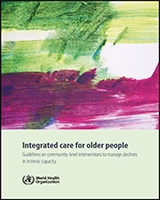5.1. Publication and dissemination
These guidelines are to be disseminated as a print publication and electronically at a dedicated section of the WHO website (http://www.who.int/ageing/health-systems/icope). The information here is organized in line with the priorities of the WHO Global strategy and action plan on ageing and health (6). All of the evidence profiles are available online, giving detailed information about the available evidence, the GRADE (Grading of Recommendations Assessment, Development and Evaluation) quality analyses, the narrative descriptions of the evidence that was not included in the GRADE tables, and the considerations of values, preferences and feasibility.
A series of subsidiary products deriving from these ICOPE guidelines support the implementation of module I (declining physical and mental capacities), module II (geriatric syndromes) and module III (caregiver support). These products include:
The ICOPE implementation guide for integrated clinical care for older people, with:
- ▶
steps on how to set person-centred care goals, develop an integrated care plan, and provide self-management support; and
- ▶
a set of colour-coded algorithms to lead the practitioner through an integrated process of assessing, classifying and managing declining physical and mental capacities in older age;
A country toolkit comprising guidance for implementing and evaluating integrated health and social care services for older people in communities;
ICOPE mobile phone technology for health workers and older people (the WHO mAgeing initiative).
The guidelines and products are developed in English to be translated into other WHO official languages for wider dissemination in collaboration with WHO regional offices.
Dissemination will be supported by the publication of selected systematic reviews and evidence in peer-reviewed journals, and presentations and workshops at key conferences and events.
These ICOPE guidelines and products are key tools to support the implementation of the Global strategy and action plan on ageing and health; activities for disseminating them were included in the strategy’s action plan approved by the World Health Assembly in 2016 (19). Actions include the piloting and evaluation of these guidelines in 20 countries by 2020.
5.2. Monitoring and evaluation
Implementation of these recommendations will be monitored at the community and health-facility levels. Data will be collected through surveys or updated lists of service availability. Special studies can be considered where routine monitoring is not feasible or appropriate. A monitoring and evaluation framework, including a list of core indicators, is to be developed and included in the ICOPE country toolkit. Indicators will measure the performance of service delivery (the health system inputs, and the processes and outputs of service delivery), as well as the feasibility and acceptability of the recommendations. An international working group of experts, including representatives of the WHO regions and countries, will develop the framework and oversee monitoring and evaluation activities. Broader stakeholder engagement in policy design, implementation, and monitoring and evaluation will help to ensure that the national adaptation of these guidelines results in programmes that are legitimate, acceptable, effective, equitable, and address community needs.
Intermediate health systems outcomes and the impacts of the interventions will be measured by the WHO global survey on Healthy Ageing, which was also included in the WHO Global strategy and action plan on ageing and health approved by the World Health Assembly (6). The global survey will provide information at a country level on health status, health needs, and how well needs are being met. This information will form the basis for international comparisons and a baseline against which to measure the impact of the programme.
The WHO Department of Ageing and Life Course will work closely with the Health Data Collaborative1 to ensure harmonization of standards and tools and alignment with the WHO 2015 global reference list of 100 core health indicators (68).
5.3. Future review and update
The WHO Department of Ageing and Life Course will regularly monitor new evidence in priority areas, with the assistance of WHO collaborating centres. The department will also collect regular feedback from country implementation teams on ICOPE products.
These ICOPE guidelines will be updated after a four-year period, applying a similarly rigorous methodology. WHO welcomes suggestions for any additional issues that should be considered for inclusion in future guidelines. Please email these to Dr Islene Araujo de Carvalho:
tni.ohw@ohlavracedojuara.
- 1

